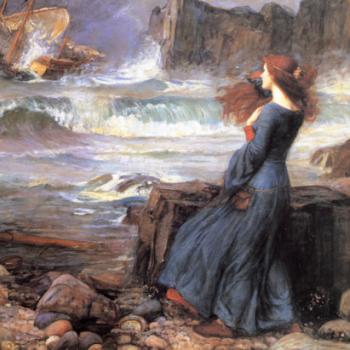 I asked for new voices and have received some wonderful writing. Here is a piece by musician and scholar Christie George. Christie is a pianist and musicologist who graduated from Biola University and the Torrey Honors Institute in 2014. She has just completed her PhD in Musicology at Claremont Graduate University, and her research deals chiefly with the nature of “good taste” with specific application in music. Christie is married to the love of her life, Garrett, and they currently reside in Cincinnati.
I asked for new voices and have received some wonderful writing. Here is a piece by musician and scholar Christie George. Christie is a pianist and musicologist who graduated from Biola University and the Torrey Honors Institute in 2014. She has just completed her PhD in Musicology at Claremont Graduate University, and her research deals chiefly with the nature of “good taste” with specific application in music. Christie is married to the love of her life, Garrett, and they currently reside in Cincinnati.
Christie George turns to one of my favorite topics story telling, good and bad:
“It is astonishing how little attention critics have paid to Story considered in itself…Those forms of literature in which Story exists merely as a means to something else—for example, the novel of manners where the story is there for the sake of the characters, or the criticism of social conditions— have had full justice done to them; but those forms in which everything else is there for the sake of the story have been given little serious attention. Not only have they been despised, as if they were fit only for children, but even the kind of pleasure they give has, in my opinion, been misunderstood. It is the second injustice which I am most anxious to remedy.”
-C. S. Lewis, “On Stories,” first read to a literary society at Merton College in 1940 as “The Kappa [hidden] Element in Romance.”
In this brief and beautiful essay, Lewis invites us to remember childhood, to remember reading and re-reading the stories which captivated us in a thorough and lasting way—those which despite their constant and almost commonplace presence in our lives, never became stale or unsurprising, because of some secret which beckoned us to love them.
In many ways, it seems critics have forgotten childhood and have thus misunderstood the hidden quality in Story which first inspires one to love it. The project of criticism is to teach the ordinary man how to see, hear, or taste what is good because one is himself tasteful, having cultivated the ability to perceive this Good. But it is hard to be a good critic if one has forgotten what it is like to read The Wind in the Willows and love it.
The enemies of Tastefulness are the very same which threaten Story: cleverness, ignorance, elitism, innovation, and perhaps most dangerous— excitement for its own sake. For Lewis, excitement alone (the kind stirred up by mere suspense or surprise) is one of the chief objects of misunderstanding when it comes to properly knowing the quality of pleasure which may be derived from Story. While it is often true that we experience pleasure when we read a story, we must ask: is a story good because it inspires a feeling of excitement in its reader, or does one become excited because his reading of a beloved story is a direct encounter with what is Good?
In the middle of 18th century Europe, conversations about the nature of “good taste” mirrored Lewis’s concern about public notions of Story and pervaded most discussions concerned with beauty, perception, and pleasure. At the fore was a question which bears great similarity to that with which Lewis grapples in his essay: is an object tasteful because it causes a general experience of pleasure in one who confronts it, or does one experience pleasure because the object in question is intrinsically tasteful?
At first, there was no consensus. In the substantial 1757 article on goût (taste) in l’Encyclopédie authored by Voltaire, Montesquieu, and D’Alembert, Montesquieu truly believed pleasure to be a particular kind of evidence for that which is tasteful (much like one who considers excitement alone to be evidence of a good story). In his mind, taste originated in the self. But both Voltaire and D’Alembert stood opposite, the latter of which asserting that Philosophy was specifically needed in order that one could more thoroughly examine the cause of his pleasure in order to know if he was responding in a manner which was true—which matched in fittingness to the Good which he encountered. For him (as it ought to be for us), good taste was rooted in the recognition of a true Other.
The difficult thing about these questions of Story and Taste is that when it comes to pleasure, we are childish on the one hand (easily pleased) while afraid of being childish on the other (when we would, perhaps, prefer to be seen as clever). But consolation answers our confusion by way of Lewis’s description of the effect of the Story of Christ. It is, he says, “a true myth: a myth working on us in the same way as the others, but with the tremendous difference that it really happened.”
The Christian is, thus, called to be the most tasteful critic. He has been uniquely allowed admittance into the Story which makes sense of all others. In Christianity, in this myth that is true, humanity is what excites us, because into humanity Divinity has come, and from humanity, man is rescued. The deepest excitement, a response to the truth of the reality of salvation, extends until it becomes worship. We realize we would have died if we had not been saved.
The best taste is therefore cultivated in the spirit of one who is willing to submit himself to this reality, recognizing that excitement, if severed from its object and giver, becomes cheap—simultaneously less human and less divine. When rooted in the story of Jesus, however, we are freed to learn how to become excited as we did when we were children, waiting to be removed from depravity, from longing, from pain, and to be instead rescued, transported to glory and to Love.













